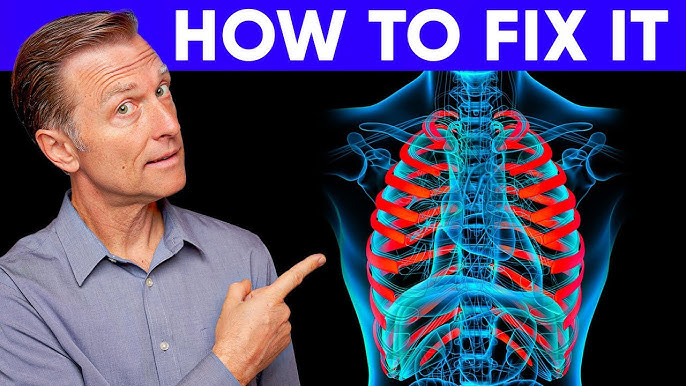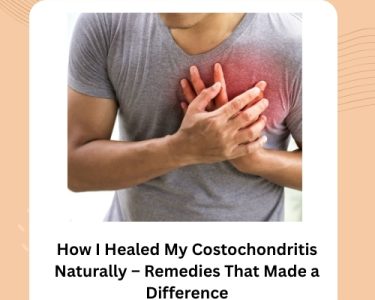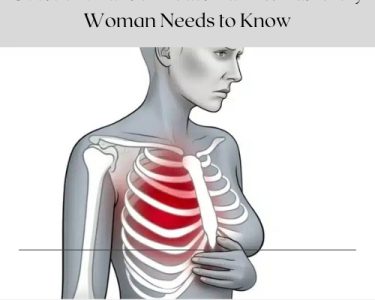Costochondritis, an inflammation of the cartilage connecting the ribs to the breastbone, can cause persistent chest pain that interferes with daily life. While traditional treatments such as pain relievers and physical therapy are common, incorporating specific vitamins into your diet may help reduce inflammation and alleviate discomfort. Here’s a guide to the best vitamins to take for costochondritis and how they can support your recovery.
What is Costochondritis?
Costochondritis is a medical condition characterized by inflammation of the cartilage that connects the ribs to the breastbone (sternum). This cartilage forms a part of the ribcage and provides flexibility, enabling the chest to expand and contract during breathing. When inflamed, this area can become tender and painful, often mimicking the symptoms of a heart attack or other serious conditions.
Symptoms of Costochondritis:
- Chest Pain: The primary symptom is sharp, aching, or pressure-like pain, typically on the left side of the chest.
- Tenderness: Pain is often worsened by pressing on the affected area of the ribcage.
- Pain Aggravated by Movement: Activities like deep breathing, coughing, sneezing, or certain upper body movements can intensify the pain.
- Localized Discomfort: The pain may be confined to a specific area where the ribs meet the sternum.
Causes of Costochondritis:
While the exact cause is often unclear, possible triggers include:
- Injury or Trauma: Direct impact or strain on the chest area.
- Overuse: Repetitive activities, such as heavy lifting or intense exercise.
- Infections: Rare bacterial or viral infections that spread to the cartilage.
- Inflammatory Conditions: Associated with arthritis or fibromyalgia.
Key Vitamins to Help Manage Costochondritis
Costochondritis, a condition characterized by inflammation of the cartilage that connects the ribs to the breastbone, can be painful and challenging to manage. While medical treatments such as anti-inflammatory medications and physical therapy are often recommended, certain vitamins may support overall health and help reduce inflammation, making them a valuable addition to your care plan.
1. Vitamin D: Supporting Bone and Cartilage Health
Benefits:
Vitamin D plays a crucial role in maintaining strong bones and cartilage. Its anti-inflammatory properties may help reduce the discomfort associated with costochondritis.
Sources:
- Sun exposure
- Fatty fish like salmon and mackerel
- Fortified foods (milk, cereal, and orange juice)
- Supplements (consult a healthcare provider for the correct dosage)
Tips:
If you live in an area with limited sunlight, consider a vitamin D supplement to ensure optimal levels.
2. Vitamin C: Boosting Collagen and Reducing Inflammation
Benefits:
Vitamin C is essential for collagen production, which supports the structural integrity of cartilage. Its antioxidant properties may also help reduce inflammation in the rib cage area.
Sources:
- Citrus fruits (oranges, lemons)
- Berries (strawberries, blueberries)
- Vegetables (bell peppers, broccoli, spinach)
Tips:
Incorporate fresh fruits and vegetables into your daily meals to naturally increase vitamin C intake.
3. Vitamin E: A Powerful Anti-inflammatory Agent
Benefits:
Vitamin E is known for its ability to combat oxidative stress and inflammation. This can be particularly beneficial in reducing the discomfort caused by costochondritis.
Sources:
- Nuts and seeds (almonds, sunflower seeds)
- Vegetable oils (olive oil, sunflower oil)
- Leafy greens (spinach, kale)
Tips:
Snack on a handful of nuts or add spinach to your smoothies for an easy vitamin E boost.
4. Vitamin B Complex: Reducing Stress and Promoting Healing
Benefits:
B vitamins, particularly B6 and B12, support nerve function and may reduce stress, which is often a trigger for costochondritis flare-ups.
Sources:
- Whole grains (brown rice, oats)
- Lean proteins (chicken, turkey, eggs)
- Dairy products (milk, yogurt)
- Fortified cereals
Tips:
Consider a B-complex supplement if you suspect a deficiency, but always check with a healthcare provider first.
5. Vitamin K2: Enhancing Cartilage Repair
Benefits:
Vitamin K2 is vital for calcium regulation and cartilage repair. It works synergistically with vitamin D to support bone and cartilage health.
Sources:
- Fermented foods (natto, sauerkraut)
- Dairy products
- Egg yolks
Tips:
A diet rich in fermented foods can naturally provide vitamin K2, but supplementation may be an option for those with dietary restrictions.
Additional Tips for Managing Costochondritis
- Balanced Diet: Include anti-inflammatory foods such as omega-3-rich fish, nuts, seeds, and fresh vegetables.
- Stay Active: Gentle exercises like yoga or stretching can help improve flexibility and reduce pain.
- Hydration: Staying hydrated supports overall joint and cartilage health.
- Avoid Triggers: Minimize activities that strain your chest muscles, such as heavy lifting.
When to See a Doctor
While vitamins can help manage costochondritis, they are not a cure. Persistent or severe pain should be evaluated by a healthcare professional to rule out other conditions and ensure you’re on the best treatment plan.
Conclusion
Incorporating the right vitamins into your diet can play a significant role in managing costochondritis pain. Focus on maintaining a balanced intake of vitamin D, C, E, B complex, and K to support cartilage health and reduce inflammation. Combine these with lifestyle adjustments for a holistic approach to relief. Always consult a healthcare provider before starting new supplements to ensure they are safe and suitable for your specific needs.




